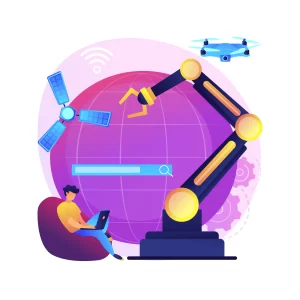AI Driving Economic Gro
Governments in the Middle East, particularly in the Gulf Cooperation Council (GCC) countries, are prioritizing AI as a key pillar of their economic diversification strategies. Saudi Arabia’s Vision 2030 and the UAE’s National AI Strategy 2031 are prime examples of initiatives aiming to position these nations as global AI hubs. AI is projected to contribute over $320 billion to the Middle East economy by 2030, accounting for nearly 14% of the region’s GDP.
Revolutionizing Key Industries
a. Healthcare
AI-powered solutions are transforming healthcare by enabling faster diagnostics, predictive analytics, and personalized treatment plans. In Saudi Arabia, AI applications like ChatGPT are being explored to enhance patient care and streamline administrative processes.
b. Financial Services
Banks and fintech companies are leveraging AI for fraud detection, credit risk assessment, and customer service automation through chatbots. For instance, UAE-based Mashreq Bank uses AI to enhance customer interactions and optimize operations.
c. Retail and E-commerce
AI-driven personalization is redefining the shopping experience in the region. Platforms like Noon and Amazon are using AI algorithms to predict consumer behavior, recommend products, and optimize inventory management.
d. Energy
Given the Middle East’s dominance in oil and gas, AI is playing a crucial role in predictive maintenance, optimizing energy production, and supporting sustainability goals.
Transforming Workforce Dynamics
AI adoption is creating demand for new skills while automating routine tasks. Industries are investing in upskilling and reskilling programs to prepare their workforce for the AI-driven future. Initiatives like Saudi Digital Academy are equipping professionals with the knowledge to thrive in an AI-enabled environment.
Challenges in AI Adoption
While the potential is vast, challenges remain:
- Regulatory Barriers: Governments are working to establish policies that balance innovation and ethical considerations.
- Skill Gaps: The lack of AI expertise is a hurdle for businesses aiming to implement AI solutions effectively.
- Data Security Concerns: Ensuring the privacy and protection of sensitive information is critical in building trust in AI systems.
The Road Ahead
The Middle East’s commitment to embracing AI signifies a future where businesses operate smarter, faster, and more sustainably. By fostering public-private collaborations, enhancing AI education, and investing in research and development, the region can unlock the full potential of AI and position itself as a global leader in technology-driven business.
Conclusion
AI is not just a trend in the Middle East—it is a cornerstone of the region’s economic evolution. As businesses integrate AI into their operations, they are not only enhancing efficiency but also contributing to a future defined by innovation and resilience. The Middle East stands at the forefront of this transformation, and the time to embrace AI’s potential is now.



